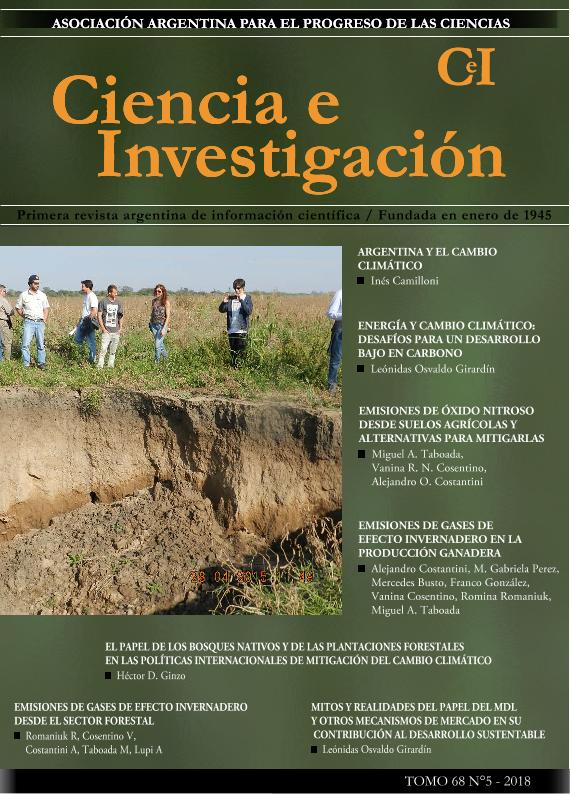Mostrar el registro sencillo del ítem
dc.contributor.author
Girardin, Leonidas Osvaldo

dc.date.available
2022-11-17T11:01:20Z
dc.date.issued
2018-12
dc.identifier.citation
Girardin, Leonidas Osvaldo; Mitos y realidades del papel del MDL y otros mecanismos de mercado en su contribución al Desarrollo Sustentable; Asociación Argentina para el Progreso de las Ciencias; Ciencia e Investigación; 68; 5; 12-2018; 72-85
dc.identifier.issn
1132-0974
dc.identifier.uri
http://hdl.handle.net/11336/178111
dc.description.abstract
El Acuerdo de París es un convenio surgido dentro de la CMNUCC que establece medidas para la limitación y/o reducción de emisiones de Gases de Efecto Invernadero. Fue firmado el 12 de diciembre de 2015, en el contexto de la 21º Conferencia de las Partes de la Convención y tiene como principal objetivo de largo plazo mantener el incremento de la temperatura media mundial por debajo de 2°C con respecto a los niveles preindustriales y, adicionalmente, que los gobiernos se comprometan a seguir trabajando para limitarlo a 1,5°C. América Latina fue una Región pionera en lo concerniente a su participación temprana en los mecanismos de reducción y/o limitación de emisiones. Esta situación se dio incluso mucho antes que el tema estuviese instalado con fuerza en otras Regiones, posteriormente muy activas en el uso del mecanismo, principalmente China y el Sudeste Asiático. No obstante, esto no redundó en “ventajas” para la región, en términos de radicación de inversiones o de establecer mejores condiciones en la negociación internacional en el marco de la CMNUCC. Esta situación lleva a lo que en algunos documentos previos se ha denominado “cierto desánimo de la Región respecto del MDL”. Es interesante explorar cómo puede jugar esto en la profundización de los compromisos de América Latina con la prevención del Cambio Climático y si bien dicho objetivo excede con creces los alcances de este breve documento, se intentarán plantear algunos temas que no se pueden pasar por alto al tratar de interpretar la problemática. A más de 20 años del Protocolo de Kioto (PK) se sigue buscando un acuerdo climático internacional consensuado, vinculante y ambicioso. No obstante, las decisiones de fondo se siguen postergando. En definitiva, es imposible para un mercado poder sobrevivir sin demanda. Y la demanda surge del grado de rigurosidad que exista en el cumplimiento de los compromisos que se asumen y en qué medida estos compromisos implican un esfuerzo real por reducir emisiones.
dc.description.abstract
The Paris Agreement is an arrangement that emerged within the UNFCCC that establishes measures for the limitation and / or reduction of emissions of greenhouse gases. It was signed on December 12, 2015, in the context of the 21st Conference of the Parties to the Convention and its main long-term objective is to maintain the increase in global average temperature below 2° C with respect to pre-industrial levels and, additionally, that governments commit themselves to continue working to limit it to 1.5 ° C. Latin America was a pioneer region in terms of its early participation in emission reduction and / or limitation mechanisms. This situation occurred even before the issue was installed with force in other Regions, later very active in the use of the mechanism, mainly China and Southeast Asia. However, this did not result in "advantages" for the region, in terms of investment settlement or to establish better conditions in the international negotiation within the framework of the UNFCCC. This situation leads to what in some previous documents has been called "certain discouragement of the Region with respect to the CDM". It is interesting to explore how this can play in the deepening of the commitments of Latin America with the prevention of Climate Change and although this objective far exceeds the scope of this brief document, we will try to raise some issues that can not be overlooked and try to interpret the problem. More than 20 years after the Kyoto Protocol (KP), a consensual, binding and ambitious international climate agreement is still being sought. However, substantive decisions continue to be postponed. In short, it is impossible for a market to survive without demand. And the demand arises from the degree of rigor that exists in the fulfillment of the commitments that are assumed and to what extent these commitments imply a real effort to reduce emissions.
dc.format
application/pdf
dc.language.iso
spa
dc.publisher
Asociación Argentina para el Progreso de las Ciencias
dc.rights
info:eu-repo/semantics/openAccess
dc.rights.uri
https://creativecommons.org/licenses/by-nc-sa/2.5/ar/
dc.subject
Cambio Climático
dc.subject
América Latina
dc.subject
Relaciones Económicas Internacionales
dc.subject
Economía del Cambio Climático
dc.subject.classification
Otras Economía y Negocios

dc.subject.classification
Economía y Negocios

dc.subject.classification
CIENCIAS SOCIALES

dc.title
Mitos y realidades del papel del MDL y otros mecanismos de mercado en su contribución al Desarrollo Sustentable
dc.type
info:eu-repo/semantics/article
dc.type
info:ar-repo/semantics/artículo
dc.type
info:eu-repo/semantics/publishedVersion
dc.date.updated
2022-11-16T11:52:22Z
dc.journal.volume
68
dc.journal.number
5
dc.journal.pagination
72-85
dc.journal.pais
Argentina

dc.journal.ciudad
Ciudad Autónoma de Buenos Aires
dc.description.fil
Fil: Girardin, Leonidas Osvaldo. Consejo Nacional de Investigaciones Científicas y Técnicas; Argentina. Fundación Bariloche. Fundación Bariloche Sede Buenos Aires. Prog.de Medio Ambiente y Desarrollo; Argentina. Universidad Nacional de Moreno; Argentina
dc.journal.title
Ciencia e Investigación

dc.relation.alternativeid
info:eu-repo/semantics/altIdentifier/url/https://aargentinapciencias.org/publicaciones/revista-resenas/revista-cei-tomo-68-no-5-2018/
Archivos asociados
